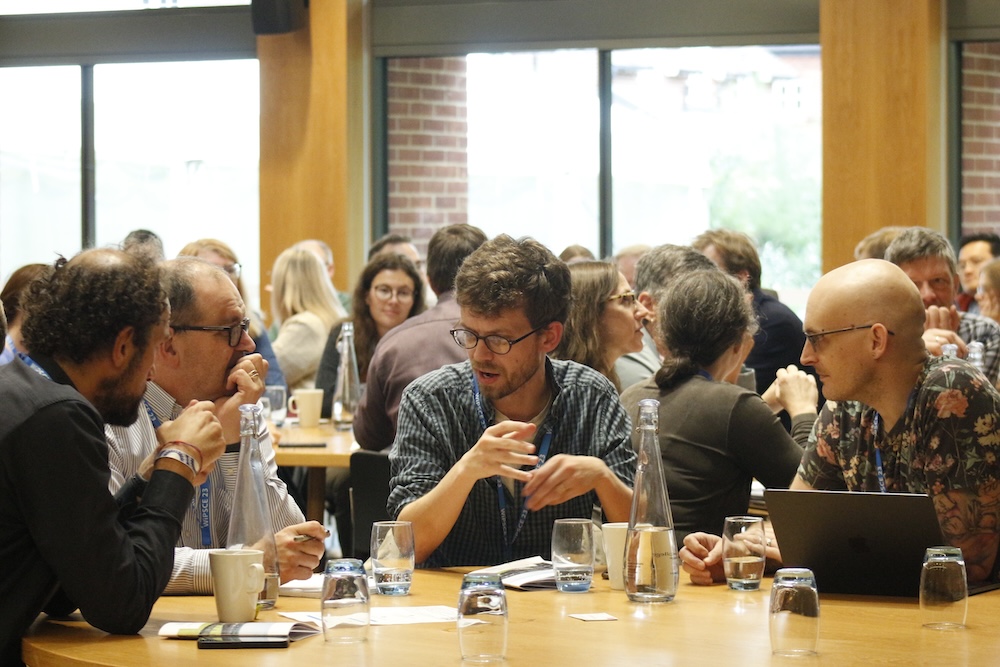
Research (noun): a detailed study of a subject, especially in order to discover (new) information or reach a (new) understanding. (Cambridge Dictionary)
All educators will have had the experience of delivering a lesson to a group of students, and as they file out, spending a few moments reflecting on how it went, what worked well and what they might like to improve. But too quickly, the next class arrives to take their seat, and the moment passes. If they’re lucky, they may carry some of those thoughts back to the staff room and chat with colleagues about them.
For many teachers, the opportunity to carry out a detailed study of an aspect of their teaching style, or the impact of approaching a topic from a different direction, to discover new information is a rare luxury – especially in a young subject such as computing.
Computing as a school subject in England
Computing, as a subject in the school curriculum, is relatively new. It is not ten years since the government moved Information Communication Technology (ICT) to Computing. It was a bold move and not without its critics. The challenge was to equip teachers with the skills and knowledge they needed to deliver this new subject effectively. Professional development, or better professional learning became the order of the day. Subject knowledge was key, as the new curriculum included many aspects of computer science that were new to the existing cohort of teachers, in particular programming knowledge and skills.
Ten years on, we are better equipped with a growing bank of resources to use in our classrooms: the subject association (Computing At School), a National Centre for Computing and many organisations and partners, such as the Raspberry Pi Foundation committed to supporting teachers of Computing.
However, that opportunity to reflect, take stock, try something new, evaluate its success and collaborate with others is rare. Much of the professional development opportunities focus on subject knowledge and to be truly effective, they need to be earthed and situated in the context of the teachers’ own classroom.
The Teacher Inquiry in Computing Education (TICE) project
In 2016, Computing At School, with the generous support of Google, designed a project to support computer science teachers in implementing their own classroom research as part of their professional development. Known as “Teacher Inquiry in Computing Education” (TICE), the project:
- offered new perspectives – “It’s stimulating, great personal CPD and makes you think about pedagogy, approach, theory, so much”,
- empowered teachers – “..the whole tone of the TICE project has made me feel that we have been empowered to advance Computing in Education – quite a unique opportunity”, and
- benefited teaching – “…opening my mind to research – how to carry it out and how it can benefit my own teaching”.
This project is a form of action research. The output is intended to provide new information to inform new practice for teachers and the wider community. The results from this project including the teacher commentary are available in this booklet.
In 2024, the project is being repeated: TICE2 has started with over 20 teachers signed up. They will be investigating a real-world problem from their own classroom with support from the Raspberry Pi Computing Education Research Centre and a team of experienced volunteers. There are a series of webinars to help the teachers understand the process and philosophy of undertaking a research project, meetings for the teachers to gather and chat about their progress, regular support sessions provided by the volunteers and other material to ensure success.
There is a fascinating mixture of projects being undertaken, including:
- In what ways does the use of Litterbox over eight weeks support Year 5 and 6 Code Clubbers to improve their perseverance, code comprehension and debugging skills in their Scratch projects? (Primary)
- In what ways is a Year 7 Computing class’s understanding of computer systems impacted on with the intervention of collaborative learning over a period of one term? (Secondary)
- What is the most effective type of teacher feedback that balances impact on students’ engagement and progress with teacher workload in KS4 Computer Science? (Secondary)
- How does the integration of generative AI tools in a Year 7 digital media project affect students’ creativity and engagement compared to traditional methods? (Secondary)
- How did the 2023 computer science exam papers assess programming skills? (A Level)
Many of these projects are running during the Spring Term of 2024, and the results will be published at the Computing At School Summer Conference. We’ll be following the progress of our teachers closely and providing updates here between now and July.
Get involved in our research
The Raspberry Pi Computing Education Research Centre (RPCERC) are running other initiatives as well as this one. If you would like to receive updates about ways to get involved in our research studies, you can sign up for our regular newsletter and the RPCERC teacher network: